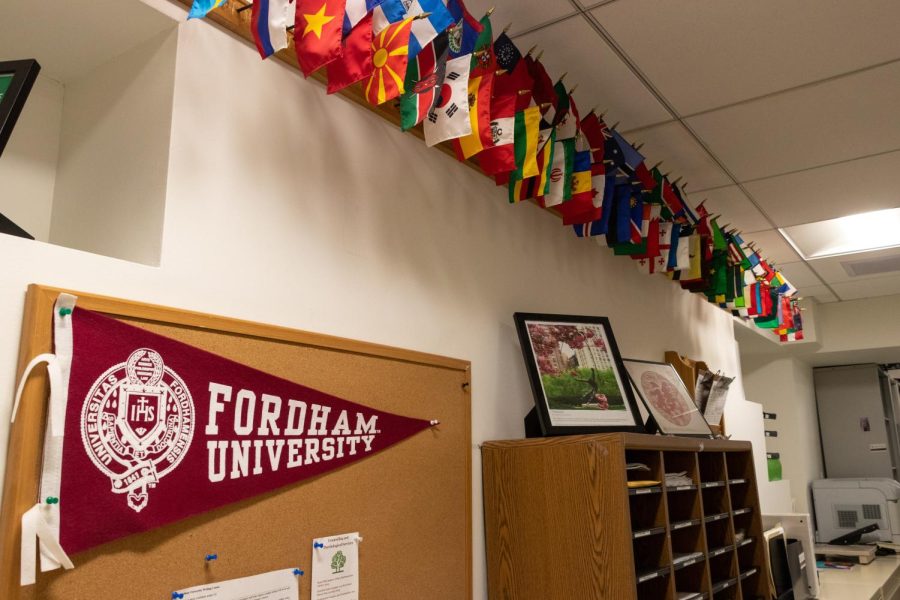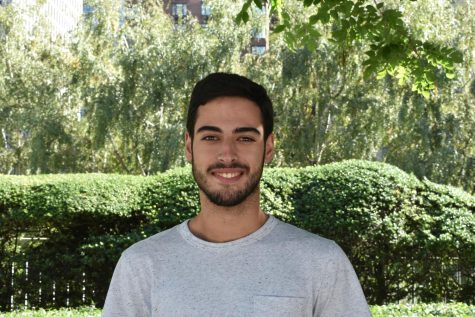International Students Seek More Support From Office of International Services
Many are wary of the university’s efforts to guide them in obtaining work permits and request more concrete support from administrative resources
OIS serves international students by providing guidance with work permits and career opportunities. Some students have expressed trouble with accessing these resources and navigating the difficult OPT application process.
April 20, 2023
A recent case decided by the U.S. Court of Appeals for the D.C. Circuit on Feb. 1 determined that the U.S. will not reconsider the expansion of Optional Practice Training (OPT). This program provides international students with temporary employment opportunities in the U.S. for at least one year after graduation, which could be extended depending on their field of study. Current international students at Fordham have reported issues with applying to the program and problems acquiring visa sponsorship, work-study and work permits, as well as finding work opportunities pre- and post-graduation.
More than 2,500 international students currently attend Fordham and rely on the Office of International Students (OIS) for assistance with government programs. Through the U.S. government, OIS is able to offer F-1 students — full-time accredited students enrolled in an academic institution — OPT, which is a year of sponsored employment relating to the F-1 student’s major area of study.
According to the U.S. Citizenship and Immigration Services, international students can receive and complete work assignments prior to or after their assigned graduation dates.
“There’s not a great wealth of campus job opportunities, so it’s a matter of dealing with high demand and limited supply.” Assistant Director of OIS Ethan Edholm
Students pursuing a degree in science, technology, engineering and mathematics (STEM) are permitted to extend their participation in the program for up to two years. Regardless of a student’s OPT status and their field of study, they must also file for H-1B work visas — a document allowing U.S. employers to hire foreign workers that must be completed six months prior to the work start date.
The Application Process
To apply for OPT, students access an application portal, and their application is reviewed by an OIS adviser. Following this, students complete documentation verifying their eligibility and enrollment status in the program. International students then file for I-765, an application for employment authorization that requires verified documents including a passport, a social security card from the U.S. government, and a letter of recommendation from OIS to achieve government and employer approval.
The decision whether or not a student will receive a OPT is determined by the academic department of the student’s major. Assistant Director of OIS Ethan Edholm explained that because of this, the process of applying for OPT sponsorship entails endorsing international students to various academic departments and the government.
Many international Fordham students have expressed that the process of obtaining OPT and sponsored work permits is made more difficult due to a lack of support and resources from OIS.
Edholm shared that challenges during the process of international students obtaining work opportunities can include competing with domestic students. While Fordham offers on-campus work opportunities through work study, the applicant pool consists of domestic and international students.
“There’s not a great wealth of campus job opportunities, so it’s a matter of dealing with high demand and limited supply,” Edholm said. “We work with students, their academic adviser, their college dean and various education departments to ensure they can work off campus.”
Student Experiences with OIS
Many international Fordham students have expressed that the process of obtaining OPT and sponsored work permits is made more difficult due to a lack of support and resources from OIS.
Minjoo Kim, Fordham College at Lincoln Center (FCLC) ’26 and an international student from Korea studying integrative neuroscience, explained that although he has yet to apply for OPT, he feels overwhelmed by the entire process. He defined the application process as “grueling” and added that some resources provided by OIS can feel inaccessible.
While OPT has existed since 1947, uncertainties and anxieties remain for international students due to the availability of jobs or work-study opportunities being lower than for domestic students who do not need to apply for work permits and visas.
Kim also expressed his concerns about OIS’ ability to support him as he continues to pursue his studies and work in STEM. He added that he feels there is a disconnect between OIS and serving the needs of international students, an area he believes the office can improve on.
“While OIS provides sufficient services, it comes down to the accessibility of resources about connecting us to employers, OPT regulations and work opportunities, which are overwhelming,” Kim said.
One student, FCLC ’23 and an international student from the United Kingdom, requested to remain anonymous due to fear of retribution from OIS. Graduating a semester early in the fall 2023 semester, the student shared that they feel overwhelmed and unsupported by staff at OIS and are concerned about the office’s ability to help them stay in the U.S. following graduation.
“Every time I have talked to someone in the office, they are very pessimistic about my prospects of staying in the U.S.,” the student said. “It definitely adds to the experience of feeling like you’re left alone on your path, and it’s your responsibility to figure out.”
While OPT has existed since 1947, uncertainties and anxieties remain for international students due to the availability of jobs or work-study opportunities being lower than for domestic students who do not need to apply for work permits and visas. According to Reuters, nearly 100,000 international students complete the OPT program each year.
The anonymous student expressed frustration with a lack of data about post-grad job placement and international student alumni that could help students understand the terrain of securing a work visa and sponsorship.
“It is discouraging for international students to receive work opportunities versus domestic students on or off campus because, in general, there is always a long and difficult process for the international population to attain a solid income in the United States.” Minjoo Kim, FCLC ’26
“Shouldn’t Fordham be able to tell us where we can get employed, and shouldn’t they support us?” the student said.
Kim echoed these sentiments, sharing that the process of attaining work is difficult, especially in the context of competition for on-campus work and securing a stable income after graduation.
“It is discouraging for international students to receive work opportunities versus domestic students on or off campus because, in general, there is always a long and difficult process for the international population to attain a solid income in the United States,” Kim said.
In response to these student sentiments, Salvatore Longarino, director of OIS, shared that due to the “vagueness” of the complaints, it is difficult for him to understand the specific struggles of the students.
“Of course we hate to hear that students are overwhelmed and don’t feel they’re getting the support they need,” he said.
Students continued to report feeling that the process of applying for work permits in the United States is frightening and anxiety-inducing.
Samantha Garcia, FCLC ’26, is an international student from the Philippines studying communications and media studies with hopes of working for a city media outlet. She noted feeling overwhelmed by the limited amount of internship and work opportunities available to her.
“There was one night I was scrolling through a certain company’s internships, and they specifically pointed out that they would not grant visas for non-U.S. citizens and you would have to find your own means of obtaining one, which freaked me out,” she said.
Although Garcia appreciates the work and effort OIS provides for its international student body, she also expressed the desire for more resources and information. She proposed workshops, infographics, webinars and frequent question-and-answer sessions as helpful tools.
Domestic and global events directly impact the work that OIS completes, as the office must adhere to changing policies and political climates.
“There is an anxiety for international students regardless of having the security of documentation because of factors like competition, securing residency and opportunity availability,” Kim added.
Students continued to report feeling that the process of applying for work permits in the United States is frightening and anxiety-inducing.
Longarino said that Fordham has many departments that are available to provide support to students, including the Office of Student Affairs and Residential Life, as well as academic deans and academic advisers. He added that students also have Counseling and Psychological Services, Public Safety, and University Health Services available if needed.
Impact of International Events on Students
Domestic and global events directly impact the work that OIS completes, as the office must adhere to changing policies and political climates. Events such as the Sept. 11 attacks, attempts to limit immigration under the Trump administration, and the COVID-19 pandemic challenged international students’ abilities to complete their studies in the United States, obtain work visas and permits, and acquire opportunities from employers willing to hire international students.
“It doesn’t matter if you apply for an internship that runs three months which does not require sponsorship; employers get scared off as soon as you indicate anything about work visa sponsorships.” anonymous student
Longarino, who has served as director of Fordham’s OIS for over 40 years, commented on the growth of the OIS department and government policy changes.
He cited the Sept. 11 attacks on the World Trade Center as a turning point, leading to the federal government perceiving international students as “terrorists.” As a result of this generalization, increased regulations were implemented on international students.
He added that while different presidents and political parties have come and gone, the effects of previous legislation remain.
Federal policies such as the Immigration and Nationality Act under the Civil Rights Act of 1964 are still put into use today. As part of the act, employers are prohibited from discriminating against individuals based on their citizenship or immigration status, yet Longarino feels employers still have the option to be “smart or fearful” in choosing whether to hire an international student.
“It comes down to the employer’s mentality, and the goal of OIS is to empower international students with their knowledge of what they can and cannot do,” she said. “We always tell our students to get as much experience as an undergraduate and build relationships with employers to keep an OPT job after graduation, and that’s the strategy.”
The anonymous student also spoke about their feelings on employers being wary of hiring international students.
“It doesn’t matter if you apply for an internship that runs three months which does not require sponsorship; employers get scared off as soon as you indicate anything about work visa sponsorships,” they said.
Edholm shared that he hopes that prospects for international students improve, emphasizing that he is currently in talks with United States Rep. Jerrold Nadler and Sen. Chuck Schumer’s offices, advocating for international students’ needs.
“We are involved outside of the university in communicating with other schools, as well as the U.S. government in regional or national conferences,” Edholm said. “Whenever we have these opportunities, we do the best we can to raise concerns and awareness for better opportunities and resources for our international students.”














